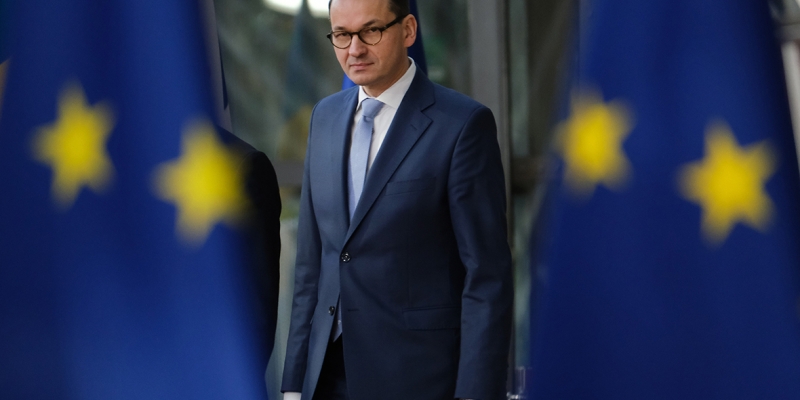The dispute over the Polish judicial reform has been dragging on since 2017. In October, the Polish Constitutional Court decided that in some cases local legislation should prevail over EU laws. Moravetsky admitted that the EC could start the Third World War

Mateusz Morawiecki
Polish Prime Minister Mateusz Morawiecki said in an interview with the Financial Times that the European Union is talking to Warsaw “with a gun to the temple”, threatening sanctions. The disagreement with Brussels was caused by the decision of the Constitutional Court of Poland on the priority of national legislation over the legislation of the European Union.
To ease tensions, Moravetsky promised to liquidate the disciplinary chamber of the Supreme Court, as required by the European Union. At the same time, the politician said that he would defend Poland with any weapon if the European Commission “starts World War III” by withholding the money promised to Warsaw.
“If the European Commission starts World War III, then we will defend our rights by any means at our disposal. We feel that [Brussels] is applying a discriminatory approach resembling a dictate. But if the situation continues to deteriorate, we will have to think carefully about our strategy,” the head of the Polish government said.
At the same time, the Prime Minister expressed hope that the parties will still be able to settle the differences that have arisen. “Fortunately, this is a political process. And political processes can be stopped by politicians. This was probably the wisest decision they (the European Commission.—RBC) can accept. Because in that case we wouldn’t talk to each other, holding pistols to the temple,” Moravetsky pointed out.
He also said that Poland has no plans to leave the EU, despite the existing differences with Brussels. “We are absolutely convinced that Poland should stay. There is no risk of Poland leaving the EU. We will zealously defend Poland as part of the European Union,” the prime minister noted and added that 88% of the country’s citizens support Poland’s membership in the EU.
Former President of the European Council, ex-Prime Minister of Poland and leader of the largest Polish opposition Civic coalition (union of parties) Donald Tusk, commenting on Morawiecki’s statement, said: “The whole world is stunned after the interview of the Polish prime minister, in which he declares the Third World War provoked by the conflict between Poland and the European Union. In politics, stupidity is the cause of most serious misfortunes, he wrote on Twitter.
In turn, Tusk’s fellow party member and former Polish Defense Minister Tomasz Semoniak wrote: “Prime Minister Morawiecki, who warns the European Commission before the Third World War against Poland, crosses all borders. First of all, he does not understand what the words “world war” mean to millions of Poles.
The strife over the Polish judicial reform has been dragging on since 2017, when the ruling Law and Justice party initiated the renewal of the judicial process. In Brussels, the reform has been repeatedly criticized, pointing out that it leads to the establishment of political control over the courts and depriving Polish citizens, who are also EU citizens, of the right to an independent judicial process. The Court of Justice of the European Union in Luxembourg ruled in July this year that the reform initiated by Warsaw undermines the independence of judges and is incompatible with EU laws.
On October 7, the Constitutional Court of Poland recognized that the decision of the EU court did not comply with the country’s legislation, and thus the supremacy of Polish law over European law was recognized.
The Polish Foreign Ministry explained that if the country recognized the rule of law of the EU, it would reduce the quality of protection of Polish citizens in court. According to the Constitution, judges appointed by the President of Poland are irremovable, and in the performance of their duties they are subject only to the Constitution and laws of Poland. “The interpretation of EU legislation challenged by the Constitutional Tribunal was aimed at undermining this principle by allowing them to appeal (judges.— RBC) decisions and actually depriving them of judicial power, which as a result deprived all citizens of legal certainty and confidence in the judicial system,” the Foreign Ministry believes.
In turn, the European Commission said that the decision of the Constitutional Court of Poland on the supremacy of the national Constitution over the laws of the European Union raises concerns. The Commission considers that European law takes precedence over national laws, including constitutional provisions.
The President of the European Parliament, David Sassoli, said that because of Poland’s decision, it could block payments from the EU budget that go to the country’s reconstruction. “The European Commission is negotiating with the Polish authorities on the fundamental principles, non-compliance with which may block the approval of the Polish reconstruction plan. The European Parliament fought for the adoption of a resolution onallocation of the [EU] budget depending on compliance with the rule of law. I think it’s time to evaluate its specific application,” noted Sassoli.
He added that there is still a chance “to avoid an irreversible crisis,” however, “the primacy of European law over national law cannot be questioned.”
Subscribe to YouTube RBC Live broadcasts, videos and recordings of broadcasts on our YouTube channel

